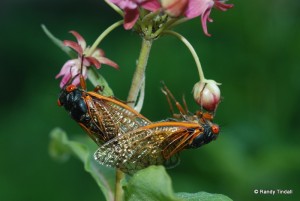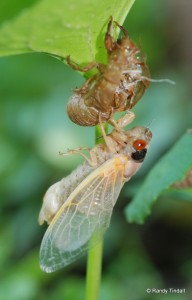The Great Southern Brood is in our backyard, playing out a small part of its epic history here during these hot, oppressive days of late May, early June—-days more reminiscent of July and August than of this supposed pre-summer interlude. Brood 19, clawing its way out of the earth and into the air, shedding suits of armor from 13 years of clinging to underground roots and launching into a short, but noisy and boisterous existence of sex and song in the trees.
Some folks comment about their “short lives”. That they live “just a couple weeks or so.” It’s almost like the dark, moist years out of sight in the soil don’t count, although they make up by far the major part of the existence of these insects. If arthropods brood (sorry) over their time on earth, I wonder how a cicada feels about the idea that only the time of soaring and singing counts as life? They sort of reverse our habit of making whoopee early on, then latching on to working-world roots to suck the juice from for the next 30-40 years. I don’t want to stretch that awkward analogy too far, but I think many of us actually do define ourselves by that brief, shining time of youth and adventure—at least for those of us lucky enough to have that, but would Magicicada feel that way?
These buzzing celebrants save the best for the end. They get the drudgery out of the way, then go out in grand style. This bunch hatched, burrowed and went to work in 1998, the year before Nadia and I arrived here and started hanging around our (their?) backyard. They were quietly underfoot this whole time, occasionally showing up in a shovelful of dirt as we dug a garden bed or planted a shrub. At least I think many of those juicy-looking grubs were cicadas. We always tried to put them back in the soil, hoping that our interruption into their affairs was not a fatal one.
We witnessed another great hatch once, back in our Southern Illinois days. We would walk out at night amongst the trees near Giant City State Park and by the light of a flashlight watch the emerging insects crawl up any vertical support they could find, a category that included us. They craved altitude, maybe to help with their first launch into the air after they pried their way out of their old clothes. We could see their wings slowly expand, as they filled with cicada fluid and began to dry. Looking down, we would find them on our legs, prickling as they climbed toward the sky and their big fling. They had done their years of dull duty, and it was now, by God, time to party!
We are now having the privilege of seeing a second eruption of boisterous cicadean life, and if we are still around these parts in 2024, we will say hello to the children of today’s choir. I might even have some pictures of the old folks to show around, frolicking and finding romance in our backyard.


